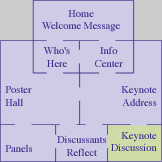Posted by:
Brian Drayton
Posted on: May 03, 2002 at 8:06 AM
Message:
I find this message full of provocative thoughts. One topic that presses on me is the tempo of reform. Thinking strictly from the teacher's point of view for a moment, the number of changes that are required by any one reform (say the move to heterogeneous grouping) are quite large, and not all obvious when you first get started. When you add to that mainstreaming, a pressure for technology integration, curriculum and governance reform etc etc, it is staggering.
It is particularly staggering when you connect this with the notion that in the end it is the teachers who realize a reform. They realize it in this year's classes, with this year's kids,and learn some things. They realize it again next year, with a different group of kids, and perhaps with different leadership... It is a lot of work. A teacher's position, like the "niche" of 1960s ecology, is not a slot, it is a multidimensional hypervolume.
The district or building leadership has a crucial role to play as regulator, or "governor" of pace and pressure. In a study Joni Falk and I did, we noticed that one district we worked in had (through a succession of superintendents) maintained a clear focus on the establishment of inquiry as an organizing theme in their science and math programs. They saw and worked on implications for other disciplines. Though it started in elem & middle school, they extended it to high school as well.
Successive new reforms were related to it with some care, and it was our observation that this reduced the demoralizing pressure on the teachers, even when the high stakes tests were implemented. NOt all was perfect there, there's plenty of issues to solve, but a clear message of respect for the teachers, as well as respect for the students, was evident in the strategic thoughtfulness of the policy.
So here is an example of a district which really does seem to have played an active and constructive role, a pedagogical role. I woudl say that it was a district which really regulated the imact of educational politics. However, it took an unusual constellation of people and attitudes, and the sort of focus on coherence that Michael Fullan and the Chicago people talk about. Yet beyond that was the sense that the pace had to be modulated -- when the superintendent was asked (about 5 yearse into their reform) when he thought it would be "done," he said, he figured if they maintained their course, another 5 years.
How does one encourage this kind of wisdom, in the current policy climate?
|


